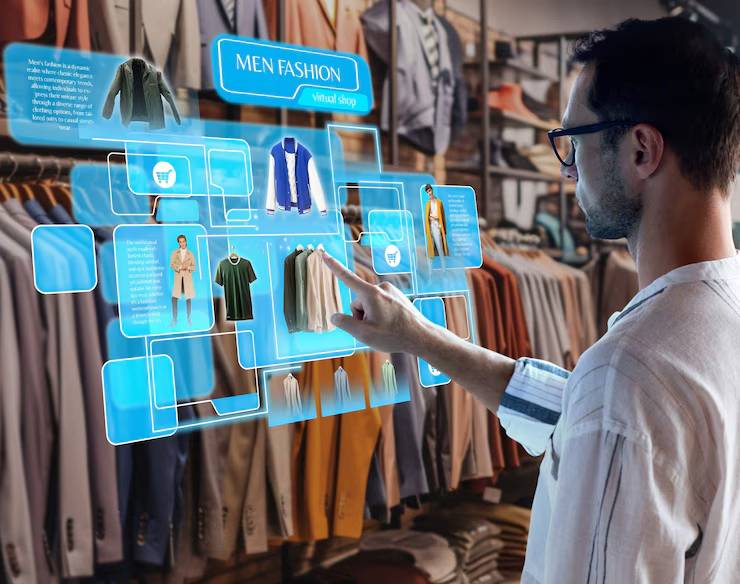AI Trends in Modern eCommerce
The adoption of AI in eCommerce has revolutionized how businesses operate and interact with customers. Reports indicate that 51% of eCommerce companies are utilizing AI, with the market for AI-enabled eCommerce solutions predicted to reach USD 16.8 billion by 2030.
In 2024, the AI for eCommerce market is expected to grow significantly, with 40% of eCommerce businesses applying AI to enhance customer service. Companies using AI have reported up to a 30% increase in sales due to personalized shopping experiences and efficient supply chain management. Machine learning algorithms are employed to forecast buying patterns, optimize inventory, and execute targeted marketing campaigns.
How Top Retailers are Using AI to Enhance Online Shopping
1. Amazon
Amazon is a leader in applying AI to transform eCommerce. AI drives personalized product recommendations and optimizes complex supply chains. Additionally, Amazon’s AI assistant, Alexa, facilitates convenient voice shopping for customers.
2. Walmart
Walmart uses AI to refine inventory management and improve customer service. Machine learning algorithms allow Walmart to accurately predict demand and optimize stock levels. The retailer also employs AI-powered chatbots to handle customer inquiries, ensuring a more efficient shopping experience.
3. eBay
eBay leverages AI to customize the shopping experience for users. Machine learning algorithms recommend products based on browsing history and past purchases. Additionally, AI tools help sellers optimize their listings for better visibility and sales.
4. Sephora
Sephora integrates AI to enhance customer experiences both online and in-store. AI provides personalized product recommendations and offers a virtual artist feature that uses augmented reality, allowing customers to try on makeup virtually.
5. Nike
Nike uses AI to offer personalized product recommendations and streamline the shopping process. The Nike app analyzes customer data with AI, suggesting products that match users’ preferences and past purchases. Nike also uses AI for efficient inventory management.
Future Trends in AI for eCommerce
The future of AI in eCommerce holds great promise, with emerging technologies poised to revolutionize how businesses operate online and interact with customers. Looking ahead, several trends are expected to dominate, driving the next wave of innovation in the industry and enhancing customer experiences.
Revolutionizing eCommerce Personalization with Advanced AI
Advanced machine learning and deep learning will play a crucial role in enhancing personalization in eCommerce. These technologies will go beyond basic product recommendations to manage customer journeys by predicting needs and creating experiences tailored to individual preferences and past behaviors. This approach will help eCommerce platforms offer highly personalized shopping experiences, boosting customer satisfaction and sales.
Enhancing eCommerce with Voice and Visual Search
The proliferation of AI-powered devices like smart speakers is driving a surge in voice search, necessitating that eCommerce businesses adapt their SEO strategies to keep pace. Additionally, visual search capabilities are advancing, allowing customers to search for products using images. This technology simplifies the shopping process and significantly enhances user engagement by providing a more interactive and seamless way to discover and purchase products.
Augmented Reality (AR) Shopping
Augmented Reality (AR) powered by AI is on the cusp of revolutionizing the online shopping landscape by allowing customers to visualize products in their own environments before making a purchase. This innovative technology enables shoppers to virtually place items such as furniture in their homes or see how clothing and accessories will look on them, providing a highly interactive and immersive shopping experience. This capability will not only boost buyer confidence, leading to higher conversion rates, but also reduce return rates by enabling customers to make more informed purchasing decisions. By integrating AR into their platforms, eCommerce businesses can offer a more engaging and satisfying shopping experience, ultimately fostering greater customer loyalty and retention.
AI-Driven Logistics and Supply Chain Management
AI is set to transform logistics and supply chain management by automating key decisions, from inventory control to delivery logistics, ensuring operations are faster and more cost-efficient. Utilizing AI technology, businesses can achieve optimal supply chain performance through real-time data analysis and automated decision-making. Predictive analytics will be vital for accurately forecasting demand and managing stock levels, minimizing waste and avoiding shortages. Additionally, AI can enhance route planning and delivery schedules, leading to improved efficiency and customer satisfaction. AI-driven systems offer the flexibility to adapt swiftly to market changes, providing a more resilient and efficient supply chain, which is essential for staying competitive in a dynamic market environment.
Smart Shopping with AI
AI will empower brands to align with the increasing consumer demand for eco-conscious shopping. Through the use of advanced data analytics, companies can reduce their environmental footprint by optimizing overproduction and enhancing the efficiency of supply chains. AI technologies enable businesses to monitor and assess every stage of production and distribution, identifying areas where waste can be reduced and resources can be used more efficiently. Additionally, AI can assist in developing eco-friendly packaging and adopting sustainable sourcing practices, further decreasing the environmental impact. By incorporating AI, brands can fulfill modern consumers’ expectations for responsible shopping while fostering a more sustainable future, thereby enhancing their reputation and customer loyalty.
AI-Enhanced Protection for eCommerce
As the eCommerce industry grows, so do the risks associated with cyber threats. AI will be essential in enhancing security measures by utilizing pattern recognition and anomaly detection to identify and prevent fraud, thereby protecting customer data. Integrating AI into e-commerce platforms goes beyond technological innovation; it’s about creating a secure, efficient, and intuitive shopping experience that meets the evolving demands of consumers. The collaboration between AI and eCommerce will foster a more connected and data-driven marketplace, ensuring robust security and increased consumer confidence.
Innovating eCommerce with AI Technologies
Leading eCommerce companies have embraced AI, transforming how they operate and engage with customers. By leveraging AI, these industry leaders have enhanced personalized shopping, optimized supply chains, and streamlined their processes, setting high standards for the sector.
The future of AI in eCommerce promises even more transformative advancements. Technologies like machine learning, augmented reality, and advanced cybersecurity will continue to revolutionize the shopping experience. For businesses striving to maintain a competitive edge, integrating AI technologies is essential.
At Ibiixo Technologies, we leverage cutting-edge AI innovations to help businesses elevate their eCommerce operations. Whether your goal is to enhance user experience, streamline logistics, or secure transactions, our expert team provides bespoke AI solutions that drive growth and innovation.
Niyati is a Digital Marketer & Content Strategist at Ibiixo Technologies PVT. LTD. She takes care of the Digital visibility of Ibiixo. Ibiixo is a US-based company that provides functional solutions for your business to enhance the customer experience. It enriches business with websites and mobile app. Ibiixo works on various niche markets that include Real Estate, Insurance, E-commerce, Social Networking, Jobs and Career, Education, etc. Also, it has expertise in developing Custom Web & Mobile App Clones for various B2B and B2C Platforms like Vacation Rental, Service Marketplace, Social Networking, Real Estate, Educational, Online Taxi Booking, Artificial Intelligence, Augmented Reality, Virtual Reality, Uber for X, etc.

![[Solved] How to Recover Deleted Tasks in Outlook](https://onlinedrifts.com/wp-content/uploads/2020/02/recover-deleted-tasks-in-outlook.png)


